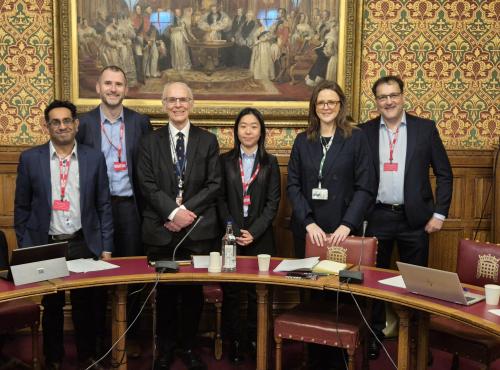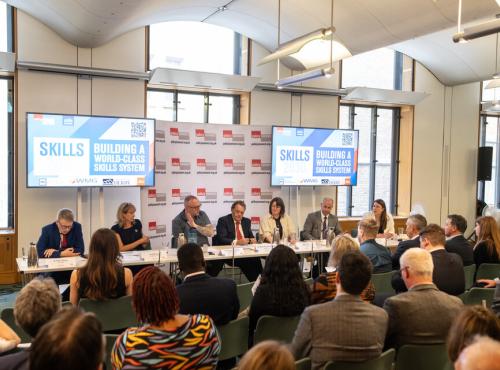Degree Apprenticeships: Up to Standard?
Findings released by the Higher Education Commission which show that degree apprenticeships may be good in theory but they’re not delivering for small employers or disadvantaged students. This is despite over 99% of UK businesses being SMEs and previous government commitments to providing a ‘head start’ for young people.
Organisations ranging from NHS Employers, IBM, Boots and BAE Systems, to more than 40 higher education providers gave evidence. The Commission also interviewed sector leaders, such as Sir Gerry Berragan, Chief Executive of Institute for Apprenticeships.
No providers for SMEs
The new report Degree Apprenticeships: Up to Standard? reveals that of 51 approved degree apprenticeship standards, 43% have no providers that are delivering to SMEs. 63% of degree apprenticeships have no or just one provider offering provision for non-levy payers (SMEs). This new evidence follows widespread sector criticism of the Education and Skills Funding Agency’s (ESFA) procurement process with many high quality education institutions, across all levels of apprenticeship, not receiving funding to meet the needs of SMEs.
Cold spots cut off would-be apprentices
Significantly, the new data shows that degree apprenticeship cold spots could be emerging in existing areas of severe educational and economic disadvantage. Presenting a double blow for disadvantaged young people, an aspiring apprentice from Norfolk could, on average, have to travel 12 times as far for the nearest opportunities compared to someone from Hammersmith & Fulham. The Commission calls for additional financial support for prospective degree apprentices from disadvantaged backgrounds, especially those from cold spots.
The report comes at a crucial time with the Government’s Augar Review into Post-18 education and funding expected to be published in a matter of weeks.
Employers need flexible qualifications for skills gaps
The length of degree apprenticeships (up to five years) will leave degree apprentices ‘stranded’ due to the absence of ‘stop-off points’. This lack of flexibility is particularly relevant for those from disadvantaged backgrounds. The report recommends building in Level 4 and 5 qualifications, a move which the HE Commission believes will make the provision more accessible for those from disadvantaged areas and cold spots. Employers were also concerned that the design of degree apprenticeships is inflexible and could quickly become out-of-date in relation to future skills needs.
Sir Chris Husbands, Vice Chancellor, Sheffield Hallam University, said: "An education system fit for the twenty-first century must ensure the acquisition of both academic and technical skills. Students need that. The nation needs that.This report is clear about the potential of degree apprenticeships to make a difference, at the same time as challenging the current model of delivery. Sheffield Hallam University has led the way in developing degree apprenticeships. We have seen interest and applications rise significantly over the last two years - but as outlined in the report, more work is needed to support learners.We need stable funding arrangements, streamlined administrative procedures for the approval of degree apprenticeships, and longer term policy stability. Putting these measures in place will help to ensure the long-term success of degree apprenticeships."
Jonathan Shaw, Chief Executive at Policy Connect, said: “The Government recognised that Britain has a real opportunity in degree apprenticeships to put business in the driving seat for the home-grown talent it needs. But now it is time to make urgent changes to them, so that we can boost our economy and jobs market.”
Easy wins “at the stroke of a pen”
The report recommends a number of ‘easy wins’ for government to implement “at the stroke of a pen”. These include:
- Create equal access for SMEs by permitting HE institutions already delivering degree apprenticeships to big businesses to deliver for small businesses
- Decrease bureaucracy and costly repetitive processes for employers and providers
- Ensure standards are approved more quickly, are fit for purpose and flexible to future needs
The report also recommends:
- Offering additional financial support for prospective degrees apprentices from cold spots and disadvantaged backgrounds
- Reviewing the barriers preventing SMEs from taking on degree apprentices that would help them address skills gaps
Tom McEwan, author of the new report said: “If the Government takes seriously its commitment to driving forward social mobility and increasing productivity then it must act to ensure that degree apprenticeships are implemented in a way that is fit for that purpose, enabling small businesses and young people who would benefit most from the provision to do so.”
Mark Farmer, Founding Director & CEO of Cast Real Estate & Construction Consultancy said: “It is pleasing to see that this inquiry has rightly highlighted the important issues that are inhibiting the full potential of degree apprenticeships in the UK. In particular it is crucial to recognise the role that higher level apprenticeships have in promoting social mobility but that this will only be enabled by simpler, less bureaucratic pathways that connect the different levels of qualifications together. It has also been noted by the HE Commission that many of the current standards are already in danger of quickly not being fit for purpose as we enter a fast moving digitally led world where a growing focus on future skills has to challenge the design and content of new standards. I hope government and the relevant institutions take note of the findings of this report and act on them accordingly.”
Verity Davidge, Head of Education and Skills Policy at EEF, the manufacturers’ organisation said: “Degree Apprenticeships alone may not be the silver bullet, but they are a key piece to solving the skills gap puzzle. Today’s report rightly shines the spotlight on the role that degree apprenticeships can play in meeting the UK’s current and future skills challenge, setting out recommendations on what must happen now and in the future to secure their success.
In particular, we support the recommendation to ensure that higher education providers are involved in the funding process. The current arbitrary funding band caps do nothing to encourage providers to deliver higher cost degree apprenticeships in subjects such as manufacturing and engineering. Higher education providers would be able to give a better steer of the true cost of delivering these subjects based on evidence.”
Key statistics from the report
- 63% of degree apprenticeship standards have no or just one provider that can deliver to non-levy payers (SMEs)
- 43% of degree apprenticeship standards have no providers that are able to deliver to non-levy payers (SMEs)
- There are 69 providers that offer the Chartered Management standard (for levy payers) compared to an average of 4 providers for all other degree apprenticeship standards. This also compares to 17 providers for chartered surveying, 13 for civil engineering, 12 for registered nursing, and 0 for paramedics
- 54% of young degree apprentice entrants are from areas of high educational advantage (quintiles 4 and 5) (OfS, 2018).






